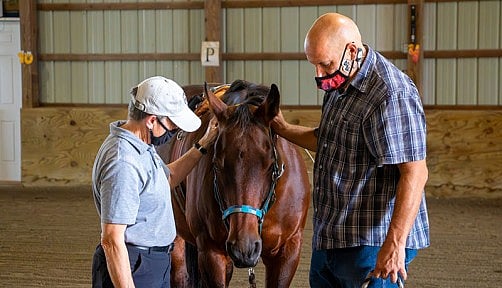Get Healthy!

- Dennis Thompson
- Posted September 20, 2024
Caring for Horses Could Help Veterans Battling PTSD
A cavalry of sorts can come to the rescue of combat veterans suffering from post-traumatic stress disorder (PTSD), a new study says.
Combat veterans who regularly care for horses experience an easing of their PTSD symptoms, as well as an overall improved mental outlook, researchers found.
Focusing on a horse’s welfare can help a veteran shed the hypervigilance that often accompanies PTSD, explained researcher Andrea Quinn, assistant director of the Center for Psychological Services in the Rutgers Graduate School of Applied and Professional Psychology.
“When I think about what our veterans with PTSD struggle with, the results make sense,” Quinn said in a Rutgers news release.
At some point, seven out of 100 veterans will develop PTSD, researchers said in background notes.
Veterans of Operation Enduring Freedom in Afghanistan have the highest rates of PTSD, with 29% experiencing it at some point, researchers noted. Veterans of Operation Iraqi Freedom in Iraq have a 21% rate of PTSD.
For the study, published recently in the journal Frontiers in Psychiatry, researchers asked six combat veterans to participate in an eight-week horsemanship program.
In 30-minute weekly sessions, veterans were instructed on basic horse safety and horse behavior, then asked to groom a horse and lead it around an arena.
“In the study, the veterans had to perform tasks requiring them to be very much in the moment,” Quinn said. “They were keeping themselves calm, and centering on the activity that was right in front of them -- talking with the horses, brushing them, leading them.”
“This kind of present-moment focus is a skill that can be developed and may help the symptoms of PTSD to feel more manageable,” Quinn added.
Stress hormone concentrations in the veterans decreased over time, as they worked with the horses.
The vets also reported fewer PTSD symptoms, compared to a control group of three veterans who didn’t participate in the horse program.
“Veterans reported more positive interactions with their horses starting in week 3 and this change was retained through the end of the sessions,” said lead researcher Ellen Rankins, a postdoctoral associate at the Temple Grandin Equine Center at Colorado State University.
Researchers also found preliminary evidence of a phenomenon called co-regulation, in which the body rhythms of the veterans started to synchronize with those of the horses.
The hope is that horse therapy might offer a PTSD therapy that’s easier for veterans. About one-third of vets drop out of the most widely used psychotherapy treatments for PTSD prior to completion, Quinn noted.
“This number is even higher in military veteran populations -- somewhere between 50 and 60 percent -- and therefore, studies looking at alternative treatments are valuable,” Quinn said.
The horses used in the exercises showed no symptoms of stress following their interactions with the veterans, the researchers noted.
“This is important because there is an increasing amount of concern among the general population for equine welfare,” said Karyn Malinowski, a professor of animal sciences at the Rutgers School of Environmental and Biological Science. “The research demonstrated that horses involved in this activity did not display any indicators of stress.”
More information
The National Center for Equine Facilitated Therapy has more on the mental health benefits of horse therapy.
SOURCE: Rutgers University, news release, Sept. 18, 2024





